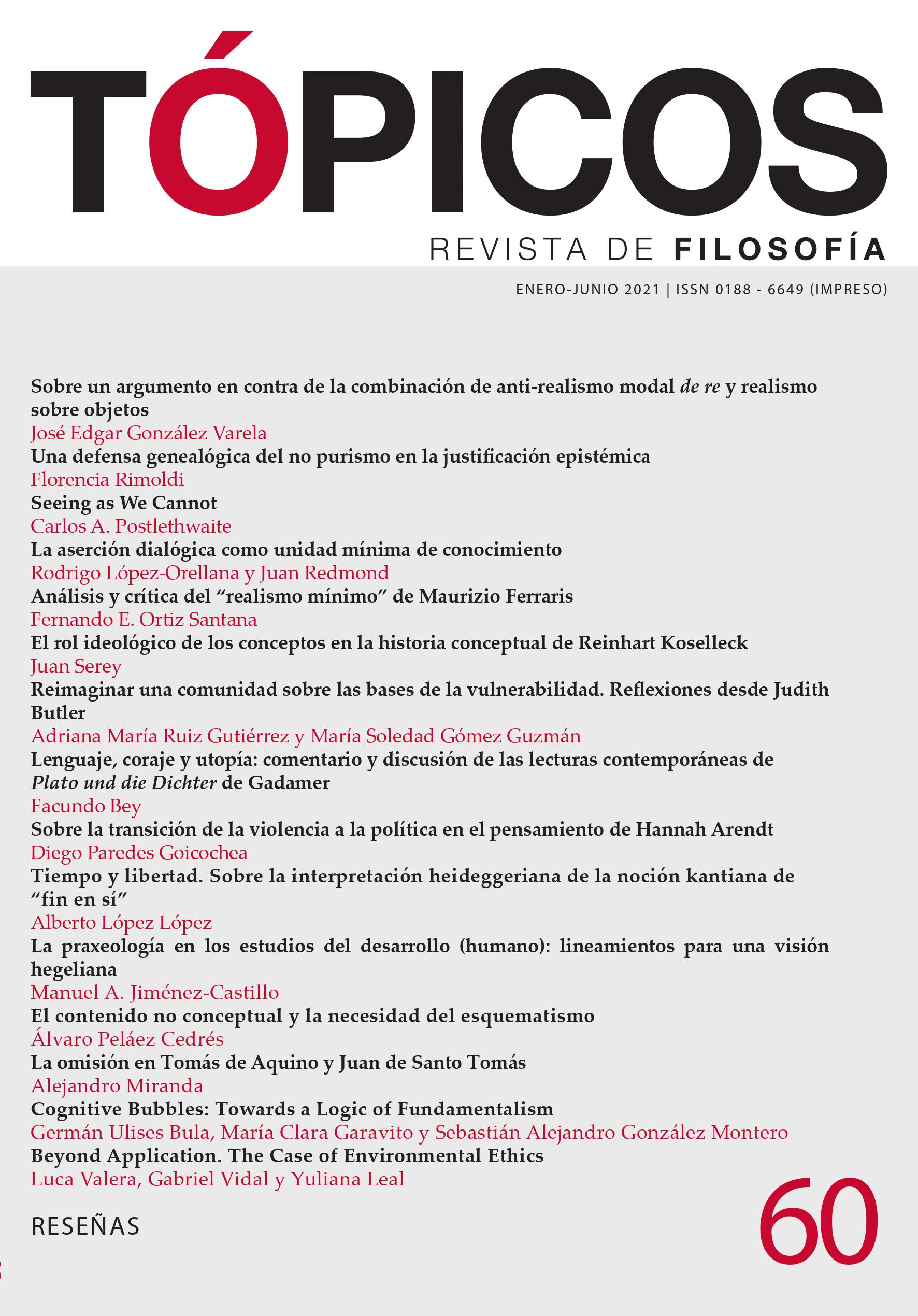On the Transition From Violence to Politics in Hannah Arendt’s Thought
Published 2020-10-27
Keywords
How to Cite
Downloads
Altmetrics
Citas
Abstract
In this article I explore the problem of the transition from violence to politics in Hannah Arendt’s thought from the perspective of her reflections on the question of war. My purpose is to show, in the first place, that the concept of “development” is inadequate to understand, in Arendtian terms, the passage from violence to politics and, secondly, to suggest an alternative understanding of this passage through the analysis of Arendt’s interpretation of the Greek and Roman treatment of the Trojan War. I indicate, in this way, that instead of addressing the transition as derivation or conversion, Arendt highlights the role of interruption and discontinuity in the transition from violence to politics.
References
- Arendt, H. (1972). Crises of the Republic. Harcourt Brace & Company.
- Arendt, H. (1976). The Origins of Totalitarianism. Harcourt Brace & Company.
- Arendt, H. (1978). The Life of the Mind. Harcourt Brace Jovanovich.
- Arendt, H. 1979). On Hannah Arendt. En M. Hill (ed.), Hannah Arendt: The Recovery of the Public World. (pp. 301-339). St. Martin’s Press.
- Arendt, H. (1990). On Revolution. Penguin.
- Arendt, H. (1993). Was ist Politik? Piper.
- Arendt, H. (1994). Essays in Understanding. 1930-1954. Schocken.
- Arendt, H. (1997). ¿Qué es la política? Paidós.
- Arendt, H. (1998). The Human Condition. University of Chicago Press.
- Arendt, H. (2000). In der Gegenwart. Übungen im politischen Denken II. Piper.
- Arendt, H. (2005). The Promise of Politics. Schocken Books.
- Arendt, H. (2006a). Between Past and Future. Eight Exercises in Political Thought. Penguin Books.
- Arendt, H. (2006b). Diario filosófico. 1950-1973. Herder.
- Arendt, H. (2018). Thinking without a Banister. Essays in Understanding. 1953-1975. Schocken Books.
- Arendt, H. y Blücher, H. (1999). Correspondance. 1936-1968. Calmann-Levy.
- Arendt, H. y Jaspers, K. (1992). Correspondence. 1926-1969. Harcourt Brace & Company.
- Balibar, E. (2010). Violence et civilité. Galilée.
- Bernstein, R. (2013). Violence. Thinking Without Banisters. Polity Press.
- Cassin, B. (2004). Grecs et Romains: les paradigmes de l’Antiquité chez Arendt et Heidegger. En M. Abensour et al. (ed.), Politique et pensée. (pp. 21-54). Payot.
- Esposito, R. (1999). El origen de la política. ¿Hannah Arendt o Simone Weil? Paidós.
- Jaspers, K. (1958). La bomba atómica y el futuro del hombre. Charla radiofónica. Taurus.
- Hilb, C. (2016). Abismos de la modernidad. Reflexiones en torno a Hannah Arendt, Claude Lefort y Leo Strauss. Fondo de Cultura Económica.
- Homero. (2013). Ilíada. Losada.
- Loraux, N. (2008). La ciudad dividida. El olvido en la memoria de Atenas. Katz.
- Paredes Goicochea, D. (2017). Política, acción, libertad. Hannah Arendt, Maurice Merleau-Ponty y Karl Marx en discusión. Editorial Unal.
- Ricoeur, P. (2004). Pouvoir et violence. En M. Abensour et al. (ed.), Politique et pensée. (pp. 205-232). Payot.
- Tassin, E. (2003). Un monde commun. Pour une cosmo-politique des conflits. Seuil.
- Vernant, J.-P. (2008). Atravesar fronteras. Entre mito y política II. Fondo de Cultura Económica.
- Virgilio. (2004). Eneida. Losada.
- Young-Bruehl, E. (2004). Hannah Arendt. For Love of the World. Yale University Press.







